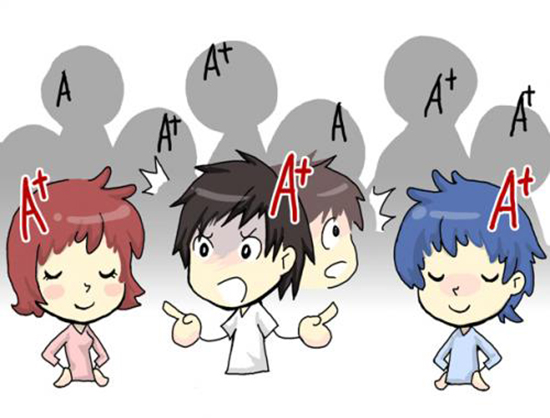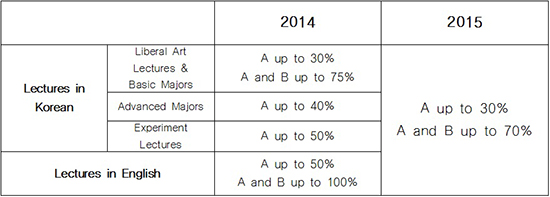Changes in grading system and various responses from Donggukians
 | ||
Causes of grade inflation
Grade inflation, a continuous rise in the students’ average grades, has become common among Korean universities. This is mainly due to the highly competitive job market. Professors give their students higher grades in order to place their students in a better place in the job market. They do so because the rate at which graduates land jobs is vital for their school reputation. This rate has even been one of the major factors considered when the government allocates subsidies and grants.
Lingering problems of grade inflation
Grade inflation trend is so pervasive and scores are so distorted. That is why many Korean employers hiring undergraduates no longer put as much emphasis on students’ transcripts recently as they did in the past. Moreover, in contrast to the monetary inflation in which prices can rise without a limit, grades have an upper limit of A or A+. In other words, grade inflation results in a greater concentration of students at the top of the distribution. This compression of grades weakens their values. Without grade inflation, a truly outstanding student might be awarded an A, while a good but less outstanding student might receive a B+. With grade inflation, perhaps both students receive the same grade, making it hard for employers and graduate schools to differentiate between them. Since students recognize this situation too, such lenient grading process can discourage students.
How Dongguk is planning to change its grading system
 | ||
| ▲ As part of the university reconstruction that starts next year, Dongguk is going to change the grading system like the graph above. Only 30 percent of students can receive A in not only Korean lectures, but also English lectures and experiment-based lectures. | ||
What do students and faculty members at Dongguk think of grade inflation?
Professor Kim Sung-ku, who teaches Buddhism and Modern Physics, said, “As long as relative evaluation exists, inflation will not value students’ effort fairly.” He emphasized that proper and reasonable evaluation is really important. “I have not felt forced to follow the school’s grading system. When students show effort and work diligently in my class, of course I give them As. I think the proportion of each grade should be up to professors.” There are some differences in students according to their school year. Ko Woo-mee, a freshman in the Division of English, said, “I have not really thought much about GPA inflation because I have just finished one semester. However, decreasing the ratio of A’s in English lectures is too harsh for us.” She gives an example of English for Academic Success 2 (EAS2) lectures. She worries, “All freshmen are divided into three groups according to the entrance exam that we took in February. Students in the same group have similar English fluency. If the ratio of A’s decreases, the competition to get higher grades would become more intense.”
Lim Gyu-ri, a sophomore majoring in Economics, said, “Reducing entrance quotas is really critical for universities. Schools may not be able to help it for their survival. There are two reasons that we register for English lectures. First, English lectures give more A’s than lectures taught in Korean, so it is easier to get a better grade. Second, they take those lectures because they are one of the graduation requirements. Regarding the College of Social Science, we have to take at least eight English lectures.” She added that if English lectures were graded the same as Korean lectures, many students would not want to take English lectures any more. A junior majoring in International Trade, who wanted her name to be anonymous, also worries about English lectures. She said, “Although I am not that good at English, I register for English lectures because there is a higher possibility of getting an A than in Korean lectures. Having said that, if the school has to restructure the grading system, it would be better to differentiate English lectures from Korean lectures like they are doing now. If the grading system for English lectures and Korean lectures is the same, there is no reason for us to take English lectures.”
Joo Hyun-seok, a faculty member of Academic Affairs, said, “If Dongguk were not included in the ‘top grade’ for university restructuring, it would be a fatal disadvantage to the school. For example, the government would reduce monetary support and the image of our school would be damaged.” He also added, “In the long run, continued grade inflation would not have a good effect on students either. If our school is considered by companies to be too generous with grades, students’ high GPA would become meaningless.” Because the university restructuring plan is led by the government, Dongguk University has no choice but to follow it. GPA is one of the basic and most important factors when applying for jobs. This is why students are in such a fierce competition to get higher grades. Joo Hyun-seok, a faculty member of Academic Affairs, said, “I think relative evaluation through fair competition is desirable. We cannot put an absolute value on students’ grades because there should be different results for different efforts.” Changes in the grade paradigm are needed. In the past, universities used to be the place where students perceive the truth and study. However, universities nowadays totally differ from what they have to pursue. Because of the heated job market, university students are now busy “speccing,” or building their resumes with various certifications, to get a better job in the future. This is not to say that achieving recognition for hard work through a high grade is bad. However, a high grade becomes more valuable when students have passion for pure learning. The true meaning of a university education is not holding dominance in the job market. Also, it is the time for students to think about what a real university education is, not just about getting a high grade.

